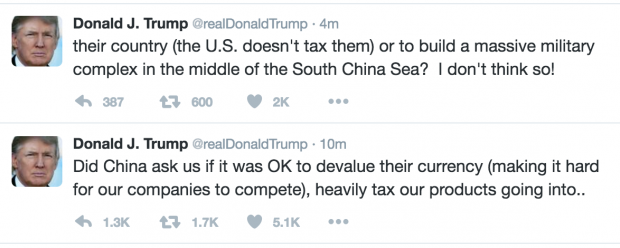Trump himself with his promise to “drain the swamp”.
Drain the swamp , so the leeches and parasite will be dried to die....
 |
| President elect - Donald Trump.. |
THERE are many conversations taking place about why the US voted for Donald Trump and the UK voted for Brexit. The extent to which the electorate feels the governing elite is “corrupt” has been overlooked, though ironically it was picked up by Trump himself with his promise to “drain the swamp”.
As much as 70 percent of EU citizens and US citizens consider their own political parties to be “corrupt” – a broad term which is based on a general sense that leaders are out for themselves rather than society as a whole.
President Obama made constant efforts to regulate the system of political lobbying, while seeking to extend the anti-bribery principles of the Foreign Corrupt Practices Act to, first of all, OECD members and later all G20 countries.
With the dawn of a new era due to start next year with Trump’s inauguration, how likely is it his administration will sustain that process? The short answer is unlikely, given his history – several bankruptcies, more than 30 court cases against him and his refusal to place his assets in a blind trust. There are five main kinds of corruption.
First, political finance. While all EU countries have fairly tight campaign finance laws they are often disregarded. Recent scandals involving the PP in Spain and the UMP in France match New Labour’s record in soliciting loans to the party to avoid the very rules it introduced under the Political Parties and Elections Act of 2000. In the US, “Citizens United” – the Supreme Court decision of 2010 – unravelled past attempts to limit corporate contributions to campaign finance and heralded a new era of “paying for policy”. The decision was heavily criticised by Bernie Sanders and more modestly by Hillary Clinton, but it is highly unlikely that Trump’s nominees for the Supreme Court will seek to roll it back.
Second, the lobbying industry. Political lobbying has escalated to the point where it keeps up to 100 000 people busy in Washington despite efforts by Senator McCain and then-Senator Obama to control it.
Third, although the finance sector and the crash of 2008 has been subjected to an unparalleled array of analyses, almost none of these have been prepared to identify corruption as a root cause. But the successful prosecution for “reckless lending” in the sub-prime market, the clearly misleading ratings by the ratings agencies and the deliberate manipulation of the interest rate and forex markets were certainly wider symptoms of a corrupt system. In the US, Senators Sanders and Warren have sought to expose the failure of the major US regulators to focus on the same issue.
Surprisingly, some in Trump’s circle – most notably Steve Bannon – are on record as suggesting that some banking CEOs should have gone to jail. But the identity of likely candidates for Treasury Secretary belies this threat.
The interface between the on-shore banking sector and “secrecy jurisdictions” which facilitate shell companies was dramatically exposed in a series of leaks culminating in the Panama Papers.
Estimates on the scale of funds held in these jurisdictions – including Switzerland – indicate a minimum of $10 trillion. It seems unlikely that a president who needs to hide his own affairs will push for transparency.
Fourth, international bribery by Western companies – supposedly a problem of the past following the OECD Anti-Bribery Convention of 1977 – continues to reflect low standards of business in emerging markets. Recent fines imposed on GSK in both the US and China and on Walmart in the US confirm the scale of the problem. Trump, meanwhile, has described the US Foreign Corrupt Practices Act of 1977 as a “horrible act”.
Fifth, self-congratulation over the Paris Agreement on climate change has disguised the fact that corruption threatens the control of carbon emissions. In the US, lobbying by powerful corporations such as Koch Industries has weakened the Environmental Protection Agency (EPA) which is responsible for setting emission targets.
Trump, as a non-believer in climate change, will certainly line up with the forces seeking to limit the power of the EPA.
Trump is a danger to the forces at work against corruption across the world, not only in the US. His election occurs at a time when strong forces in the developing world such as Brazil, India and South Africa are embracing the need to address corruption as a threat to the nation state. For the West, led by the US, to step backwards on its commitment to fight corruption would be fatal to the global anti-corruption effort.
● Cockcroft is a co-founder of Transparency International and co-author of the forthcoming book "Unmasked: Corruption in the West"



